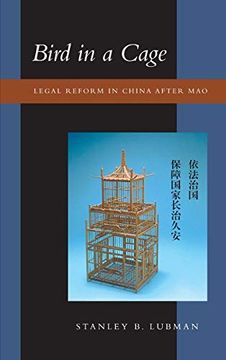Compartir
Bird in a Cage: Legal Reform in China After mao (en Inglés)
Stanley B. Lubman (Autor)
·
Stanford University Press
· Tapa Dura
Bird in a Cage: Legal Reform in China After mao (en Inglés) - Stanley B. Lubman
305,12 €
321,18 €
Ahorras: 16,06 €
Elige la lista en la que quieres agregar tu producto o crea una nueva lista
✓ Producto agregado correctamente a la lista de deseos.
Ir a Mis Listas
Origen: Estados Unidos
(Costos de importación incluídos en el precio)
Se enviará desde nuestra bodega entre el
Lunes 03 de Junio y el
Jueves 20 de Junio.
Lo recibirás en cualquier lugar de España entre 1 y 5 días hábiles luego del envío.
Reseña del libro "Bird in a Cage: Legal Reform in China After mao (en Inglés)"
Since 1979, China has been building new legal institutions made necessary by economic reforms that have reduced the role of state planning, and by the decline of Maoist totalitarianism. This book analyzes the principal legal institutions that have emerged and assesses the prospects for increasing the rule of law in China.The book first establishes the cultural and institutional context in which legal reforms take place. It traces the main features of pre-Communist Chinese legal tradition, the drastic impact on law of thirty years of Maoist rule, and the extensive changes throughout Chinese society since Mao’s death, notably the rise of the local party-state at the expense of central government power. The book’s analysis begins with the Chinese leadership’s policy toward law, identifying basic ambivalence toward law that makes the Chinese commitment to legality incomplete. It then surveys major developments, emphasizing the creation of new rights, revision of criminal law and procedure, and construction of a nascent administrative law.The book then examines in detail dispute resolution by extrajudicial mediation and the courts. Although mediation is no longer infused with Maoism, it is still used as an instrument to maintain public order. The study of the courts examines court organization, the selection and training of judges, the rise of litigation, the critical influence of localism, and ongoing conflicts between professionalism and a continuing tendency to view the judge as a soldier of the state. The author suggests that the limited role that Chinese courts are today permitted to play combines with the organization of the judicial process and the mentality of the judiciary to make Chinese adjudication more akin to bureaucratic decision making than judging in the West.How should the accomplishments of legal reform and the continuing obstacles to further reform affect U.S. policy toward China? The book concludes by appraising implications for U.S. policy on such issues as human rights, Chinese involvement with the World Trade Organization, and bilateral relations generally. The author argues that U.S. policy makers must neither moralize about the rule of law nor dismiss it as a concept alien to China. They must also curb both optimism and expectations that legal reform will lead to political reform. Chinese law can only grow slowly, no matter how urgently the West may desire quick progress.
- 0% (0)
- 0% (0)
- 0% (0)
- 0% (0)
- 0% (0)
Todos los libros de nuestro catálogo son Originales.
El libro está escrito en Inglés.
La encuadernación de esta edición es Tapa Dura.
✓ Producto agregado correctamente al carro, Ir a Pagar.

